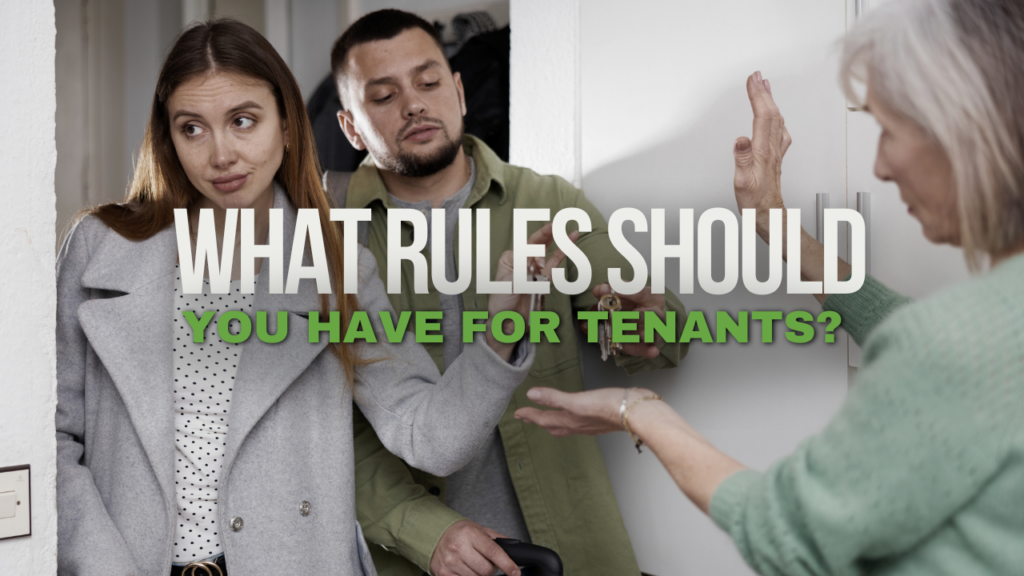What Rules Should You Have for Tenants?
As a property owner or landlord, creating clear and effective tenant rules is essential for maintaining your property’s value, ensuring tenant safety, and fostering a positive landlord-tenant relationship. These rules act as the foundation for a harmonious rental experience and can help avoid misunderstandings and disputes. This article will guide you through the key rules to establish, legal considerations in Canada, and practical tips for enforcing them.

Why Tenant Rules Are Essential
Tenant rules aren’t just about setting boundaries; they are about protecting your investment and creating a safe and respectful environment. Clear rules:
- Safeguard your property from damage.
- Provide tenants with guidelines for responsible living.
- Help resolve potential conflicts by defining expectations upfront.
By establishing rules, you create a win-win situation where your property is cared for, and tenants enjoy a well-maintained and peaceful home.
Key Areas to Cover in Tenant Rules
1. Property Use
Specify how the property should and shouldn’t be used. For instance:
- No illegal activities or business operations without prior approval.
- Subletting is prohibited unless explicitly permitted in the lease.
2. Maintenance Responsibilities
Tenants should keep the property in good condition. This includes:
- Regular cleaning of their unit.
- Promptly reporting damages or maintenance issues.
- Disposing of garbage and recycling appropriately.
3. Noise and Disturbances
To ensure a peaceful living environment:
- Set quiet hours (e.g., 10 PM to 7 AM).
- Prohibit excessive noise, especially in shared spaces like hallways or outdoor areas.
4. Guest Policy
Avoid overcrowding and unauthorized tenants by limiting guest stays. For example:
- Guests may stay up to 7 consecutive days without prior written approval.
5. Pets
Clarify whether pets are allowed. If they are:
- Outline restrictions on size, breed, or number.
- Require a pet deposit or monthly pet fee where permissible.
6. Parking and Storage
Rules for parking spaces and storage units should address:
- Designated areas and prohibited zones (e.g., no parking in fire lanes).
- Proper labeling or securing of personal items in shared storage areas.
7. Alterations
Prohibit or regulate modifications to the property, such as:
- Painting walls or installing fixtures without written consent.
- Removing or altering appliances or permanent features.
Legal Considerations for Tenant Rules in Canada
Landlords in Canada must ensure their rules comply with provincial and federal regulations, such as the Residential Tenancies Act (RTA) in Ontario or its equivalents in other provinces. Key points include:
- Rules must not violate tenant rights (e.g., the right to quiet enjoyment).
- Avoid discrimination based on protected characteristics like race, religion, or family status as per the Canadian Human Rights Act.
- Rules must be included in the lease agreement for enforceability.
Resources for landlords:
- Canada Mortgage and Housing Corporation (CMHC): Guidelines for landlords and tenants.
- Ontario Residential Tenancies Act (RTA): Legal framework for landlords in Ontario.
- Landlord and Tenant Boards by Province: Province-specific regulations and dispute resolution resources.
Tips for Enforcing Tenant Rules
- Communicate Clearly:
Discuss rules during lease signing, and provide tenants with a written copy. - Send Reminders:
Periodic newsletters or emails can help reinforce rules, especially for common violations like noise or garbage disposal. - Handle Violations Professionally:
Use a tiered approach:
- Start with a verbal or written warning.
- Escalate to formal notices if necessary.
- Use eviction as a last resort, following legal procedures.
Examples of Fair and Effective Rules
- A property in Hamilton saw a drastic reduction in noise complaints after implementing clear quiet hours and communicating them to tenants.
- Landlords in Toronto found that specifying pet rules upfront (e.g., requiring proof of vaccinations) prevented conflicts between tenants.
Conclusion
Tenant rules are a critical component of effective property management. By establishing clear, fair, and enforceable rules, landlords can protect their investments and foster positive relationships with tenants.
